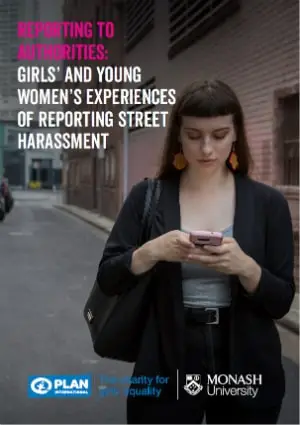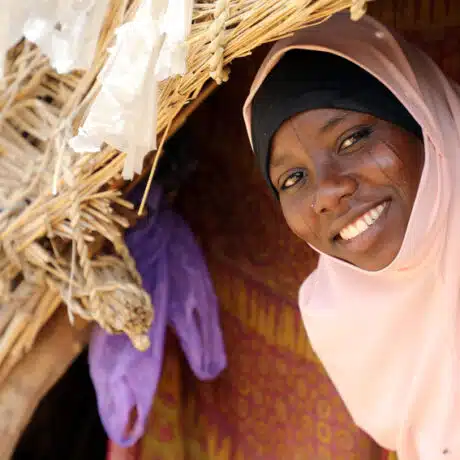News and Stories - Girls Rights - 3 December 2019
Report Launch: Reporting to Authorities

Our Safer Cities work has evolved in amazing ways over the last four years, and today the evolution continues, with the launch of our latest research, the Reporting to Authorities report.
Utilising data collected via our Safer Cities Free to Be project in 2018 with Monash XYX Lab and Crowdspot, the report is a major study on street harassment, and urges authorities to improve reporting outcomes for girls and young women. In the original project, young women and girls from Sydney, Madrid, Lima, Kampala and Delhi dropped pins on maps, representing areas they felt safe and unsafe in their cities. Of these pins, 14,500 represented specific incidents or locations where they felt unsafe.
In this new Reporting to Authorities report, a deeper look at these findings reveals that fewer than 1 in 10 of these incidents of sexual harassment were reported to an authority and when they were reported, 67% of these reports were not acted upon or taken seriously by authorities.
When it came to incidents that were sexual in nature, the response rate from authorities in Delhi was the lowest of all cities (2% of reports of sexual harassment were acted upon), followed by Lima (16%), Kampala (18%) and Madrid (32%). Sydney fared the best out of the five locations with one in three (34%) sexual harassment incidents reported to authorities resulting in some kind of action.
Across the five cities, young women noted that most responses from authorities were trivialised, with responses ranging from belittling, disbelief and dismissal, to further harassment from authorities themselves and a complete lack of justice, resulting in frustration and a lack of trust in the system.
This failure to respond appropriately and take action allows daily harassment to continue, perpetuating attitudes and behaviour that Plan International Australia CEO Susanne Legena says women and girls should no longer have to deal with.
“For too long women and girls everywhere have just endured harassment as a normal part of their daily lives. Trivialising or ignoring these experiences reinforces the belief that reporting is just not worth it and that girls and young women are unable to rely on others for support. This leads to an internalisation of stigma and shame, as well as propping up a toxic culture where street harassment is normalised and treated as trivial or minor.”
As part of the Reporting to Authorities report, Plan International Australia is calling for the following actions to improve reporting outcomes for girls and young women:
- Authorities must invest in gender-sensitive education and training on street harassment and how to respond.
- Reporting systems must be clear and simple, have the option for anonymity and all reports must be taken seriously and treated with respect, regardless of the perceived severity of the incident.
- Clear pathways to report harassment must be set up and promoted, such as a dedicated email address, the introduction of a 24-hour sexual harassment reporting hotline or app.
- Authorities should invest in public awareness campaigns to encourage reporting of all forms of street harassment: even if they are not deemed ‘serious’, it all adds to the body of evidence.
- Governments should review current legislation to ensure perpetrators of street harassment are held accountable.
- Widespread education campaigns must make it clear harassment will not be tolerated and that women and girls should report, in addition to bystander campaigns to prevent the behaviour from occurring.
Read the full report
Initiatives improving safety for women and girls announced
The launch of today’s report coincides with A City for People – Women and Safety in the City, a major symposium on women’s safety in Sydney, led by the Greater Sydney Commission.
At yesterday’s event, The Greater Sydney Commission announced the development of a Charter to guide efforts by city-makers and government organisations to make Greater Sydney a safer place for girls and women.
Meanwhile Transport NSW announced an innovation challenge, inviting start-ups and businesses to submit ideas around how technology could help combat the issue of harassment – to get involved, contact Transport NSW’s Digital Accelerator.
Both initiatives are to be developed in time for International Women’s Day in March 2020, and the Greater Sydney Commission’s Chief Commissioner, Lucy Turnbull AO, says the Charter will be an important milestone in making Greater Sydney a city where women and girls always feel safe and can fully participate in the social and economic opportunities it offers.
“Two of our partners in today’s symposium – the not-for-profit group Plan International Australia and the Committee for Sydney – have done considerable groundwork in investigating what makes women of all ages feel unsafe in the city. Today, we want to establish a tangible way forward that improves not just physical safety for girls and women but makes them feel safe and capable of going about their lives free from harassment and fear. We want the Charter to guide the planning of places and services across Greater Sydney that give priority to the safety of girls and women. And if it is safer for them, it will be safer for everyone.”
Attendees at the event included key representatives from government agencies, local councils, business, youth organisations and the not-for profit sector, and the next steps will require collaboration between Plan International, the Commission, Transport for NSW and the Committee for Sydney.
“Our intention is for concrete commitments to emerge from today’s symposium that can change the thinking and drive the actions of planners and service providers to make Greater Sydney a safer and more inclusive place, where every citizen is able to participate safely and without fear.”
– Lucy Turnbull, Chief Commissioner
Yesterday also saw Plan International youth activists around the globe take part in a #ChalkBack activity in collaboration with anti-harassment initiative Chalk Back. Activists documented catcalls they’d been subjected to by chalking them on city streets and pavements, to start a conversation and raise awareness of the need to end street harassment. The activity also marks 16 Days of Activism against Gender-Based Violence, an annual campaign calling for the elimination of violence against women and girls around the world.
About the Safer Cities Free to Be project:
Plan International’s crowd-mapping survey Free to Be enabled girls and young women to identify and share the location of public spaces that make them feel uneasy and scared or happy and safe, and detail the reasons why. The survey was designed in collaboration with Crowdspot, Monash University’s XYX Lab and young women, in alignment with Plan International’s values on research and advocacy in the best interests of the child. Read more about the results from this work in the Unsafe in the City report.
About Monash University’s XYX Lab
XYX Lab is a team of experienced design researchers exploring gender-sensitive design practices and theory based at Monash University’s Art, Design and Architecture faculty. Their work operates at the intersection of gender, identity, urban space and advocacy. Through their work, they bring together planners, policy makers, local government and stakeholders to make tangible the experiences of underrepresented communities in urban space and planning.






